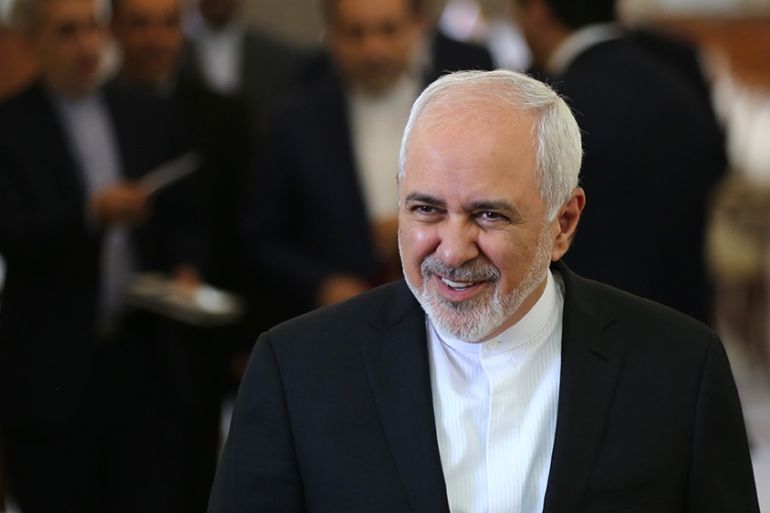Iran threatens to reduce nuclear deal commitments further
Foreign Minister Zarif also offers to hold talks with rival Saudi Arabia, and tells US’ Pompeo not to come to Tehran.

Iran has threatened to cut its commitments under the international nuclear deal further unless European partners move to protect it from US sanctions by ensuring it can sell oil and receive income.
Foreign Minister Mohammad Javad Zarif also told state television on Wednesday that Iran was ready to negotiate with arch rival Saudi Arabia, and said US Secretary of State Mike Pompeo was not welcome in Tehran.
Keep reading
list of 4 itemsIsraeli minister suggests reported attack on Iran was ’feeble’
Israeli attack on nuclear sites to prompt tit-for-tat, pursuing nukes: Iran
Bombs and viruses: The shadowy history of Israel’s attacks on Iranian soil
“Under current circumstances and if no action is taken [by the Europeans] we will take the next step [in cutting commitments],” said Zarif.
Iran has said it will reduce its commitment to the landmark 2015 nuclear accord in stages and may even withdraw from the pact unless the Europeans find ways to shield its economy from the devastating US sanctions.
US President Donald Trump withdrew from the historic nuclear accord last year calling it “the worst deal ever” and reimposed the punishing sanctions.
|
|
Saudi-Iran dialogue?
Zarif also said Iran was ready to talk with Saudi Arabia over their differences if Riyadh was also ready, according to IRIB news agency.
“If Saudi Arabia is ready for dialogue, we are always ready for dialogue with our neighbours,” he said.
“We have never closed the door to dialogue with our neighbours and we will never close the door to dialogue with our neighbours.”
Saudi Arabia accuses Iran of regional interference in the wars in Syria and Yemen and funding armed groups against its interests.
Tensions have spiked between the rivals vying for predominance in the Middle East since Riyadh accused the Islamic republic of carrying out attacks that damaged six oil tankers in the Gulf – an allegation Tehran has denied.
Zarif also said Iran could hold similar talks with the United Arab Emirates (UAE), a close ally of the Saudis, adding, “If they change their policies it is a very good opportunity for dialogue.”
On Tuesday, officials from the UAE and Iran met to discuss maritime security for the first time in six years amid the spike in tensions in the Gulf.
An Emirati official – speaking on condition of anonymity because he was not authorised to discuss the talks – said the meetings focused on issues related to border security and navigation in shared waters, describing the discussions as “nothing new” and unrelated to current tensions.
The state-run IRAN daily reported a seven-member delegation from Abu Dhabi met with Iranian border and coastguard commanders in Tehran in the first such meeting since 2013.
‘Hypocritical gesture’
The UAE and Saudi Arabia view Iran as a regional menace and are at war with Iran-aligned rebels in Yemen.
|
|
The UAE has long lobbied for a more hawkish US policy towards Iran, but as tensions have risen in recent months, fears of a wider conflict have prompted the UAE to call for de-escalation.
Zarif also dismissed US Secretary of States Pompeo’s offer to visit Iran and address the Iranian people as a “hypocritical gesture”.
“You don’t need to come to Iran,” Zarif told reporters, addressing Pompeo.
On Monday, Pompeo tweeted: “We aren’t afraid of [Zarif] coming to America where he enjoys the right to speak freely. Are the facts of the [Khamenei] regime so bad he cannot let me do the same thing in Tehran?” he said, referring to Supreme Leader Ali Hosseini Khamenei.
“What if his people heard the truth, unfiltered, unabridged?”
US-Iranian tensions have soared in recent months after Tehran shot down an American drone and Washington nearly launched air strikes in response.